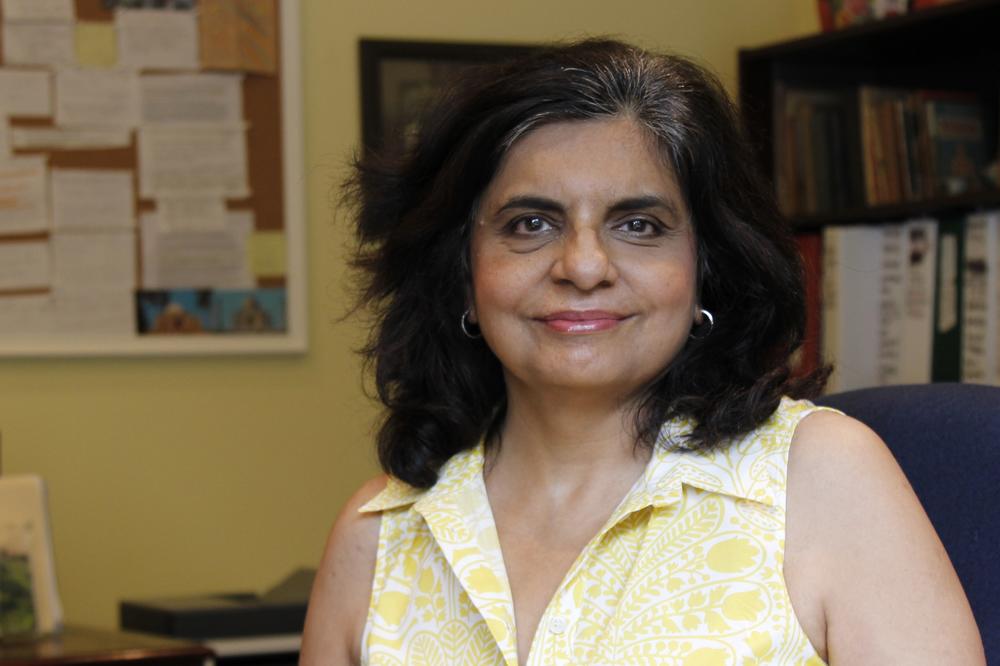
Section Branding
Header Content
Twin sisters pursue dreams of becoming artists in 1950s India in Atlanta author's debut novel
Primary Content
GPB's Peter Biello speaks with author Parul Kapur about her debut novel.

In Atlanta author Parul Kapur's debut novel, Inside the Mirror, twin sisters in 1950s Bombay pursue their artistic ambitions against the wishes of their father and a society bent on prescribing their paths through life. As one sister pursues painting, the other strives to become a dancer. Both sisters use their art to process how their family and their country changes as British control of the country ends. Inside the Mirror is the winner of the 2022 AWP Prize for the Novel. GPB's Peter Biello visited Kapur in her writing studio to talk about her book.
Peter Biello: Let's start first by talking a little bit about the context for the story and the history that was happening at the time. This is post-partition India, so early 1950s. And your main characters, the twins, they're living in Bombay. Can you describe the state of the country at that time?
Parul Kapur: What happened in 1947 when the British left was they partitioned India into — It became India, West Pakistan and East Pakistan. And that partition, literally as they were leaving, created absolute catastrophe in the nation. Nobody actually anticipated that it would be as violent as it was. About 2 to 3 million people were killed just on the western border of India, which is West Pakistan. And that's actually the region that affected my father's family. And so the twin sisters, while their family is not directly impacted by this partition (they're not refugees because they living in the city of Bombay, which was relatively unaffected because of its geographical location). But some of their relatives who were affected in the Punjab and some who were living in Karachi, they came and took refuge with these sisters because people had no homes ... like my father's family, taking refuge with whatever relative you had in whatever city. And really, it's a big wound for them. Even when you're a witness to tragedy, it is a wound for you also. And so through that wound, in a sense, is how their art is born.
Peter Biello: When we meet these two sisters, Jaya and Kamlesh, they're 19-ish — about 19, and Jaya and Kamlesh they both are assigned careers from their father, who's progressive at the time, and he's saying, yes, education for them. Here's what you should do. And prescribing for Jaya a medical career; for Kamlesh a job as a teacher. But they both have artistic ambitions. Jaya wants to paint. Kamlesh wants to dance and perform. And therein lies the central tension for them. Can you describe who they are and how you came to figure out who they are?
Parul Kapur: Yes. So figuring out who they are was a process of really of understanding their time and their culture. So, as I say, they had these refugee relatives living with them for — some for weeks, some for months. They were hearing these stories and they were young girls. So they were old enough to understand, but not old enough to really emotionally process everything. And so Jaya starts drawing these horrible incidents that she's hearing about: women relatives weeping in their apartment, and she starts drawing the stories that she's hearing. Her sister Kamlesh has a different impulse, which is, they find out about dance classes in the neighborhood and she starts taking dance. ... So the arts also become part of their way of processing this emotional grief. Now, when they get older, this comes into big conflict with their family and society because a woman ... the father has chosen their professions for them, and he's progressive in that way, but a woman could not be an artist because that requires a level of freedom and ability to voice yourself. That is a social disgrace. And social disgrace in India is a very serious thing. It's like if you bring shame on your family, it's almost as if they lose so much standing in society that they lose their ability to survive. Your reputation is part of your value and your power in this society, and your ability to thrive and survive in it.
Parul Kapur's novel is also the subject of the latest episode of Narrative Edge, a podcast about books with Georgia connections hosted by Orlando Montoya and Peter Biello. You can find Narrative Edge wherever you get your podcasts.

